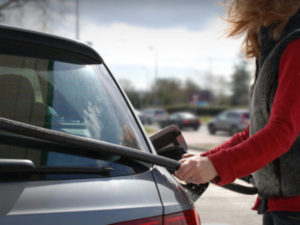Real-world fleet fuel consumption gap shows signs of slowdown
The gap between official and real-world fuel consumption/CO2 emissions plateaued in 2017 for the first time in years, including for company cars.
Figures from the International Council on Clean Transportation (ICCT) show that gap for company cars declined slightly in 2017 to 42% compared to 43% in 2016 and 2015 – but was still up significantly on the figure of 14% recorded for 2006.
It was a similar picture for the aggregated data across private and company cars; the gap in 2017 declined slightly to 39%, compared to 40% in 2016, 39% in 2015 and 36% in 2014. And the gap back in 2001 stood at just 8%.
“It is the first time since we began our monitoring in 2012 that we observe a slight decrease in the gap between official and real-world values, to a level of 39%” said Uwe Tietge, a researcher at ICCT Europe and lead author of the study. “Until now, the gap had increased from year to year.”
However, despite the slowdown, the discrepancy between official measurements of vehicle efficiency and actual performance of new cars in everyday driving has more than quadrupled since 2001 when it stood at 8%. As a result, less than half of the on-paper reductions in CO2 emission values since 2001 have been realised in practice. And in terms of cost, the driver of an average vehicle pays an extra €400 (£351) per year in fuel costs
The research is based on a statistical analysis of data for more than 1.3 million vehicles from eight European countries – Germany, the UK, France, the Netherlands, Belgium, Switzerland Spain and Sweden – and does not take into account the effects from the September 2018 shift to the new WLTP testing cycle.
The ICCT researchers said the slight decrease between official and real-world figures might be the result of manufacturer awareness of the increased public attention on the real-world performance of vehicles in the aftermath of Dieselgate. However, it may also be the result of limited regulatory pressure to reduce official CO2 emission values of new vehicles as carmakers have already meet their respective CO2 targets for the year 2015 and the next set of targets doesn’t kick in till 2020.
The ICCT also said that forthcoming CO2 targets – which require carmakers to cut emissions of new cars by 37.5% between 2021 and 2030 – showed that the regulators had learned from previous mistake. Under the new rules, it was agreed that the Commission will develop a system using information from fuel consumption meters to ensure emission reductions are delivered on the road, although this will not come into force until 2030.
Dr Peter Mock, managing director ICCT Europe, said: “It is now crucial that the real-world data collected from manufacturers be made transparent to consumers as well as researchers,” warns Dr. Mock. “Furthermore, the European Commission should swiftly develop a methodology to penalize manufacturers that provide unrealistically low fuel consumption data to their customers, in an effort to not only stabilize but actually decrease the real-world gap in the years to come.”


















